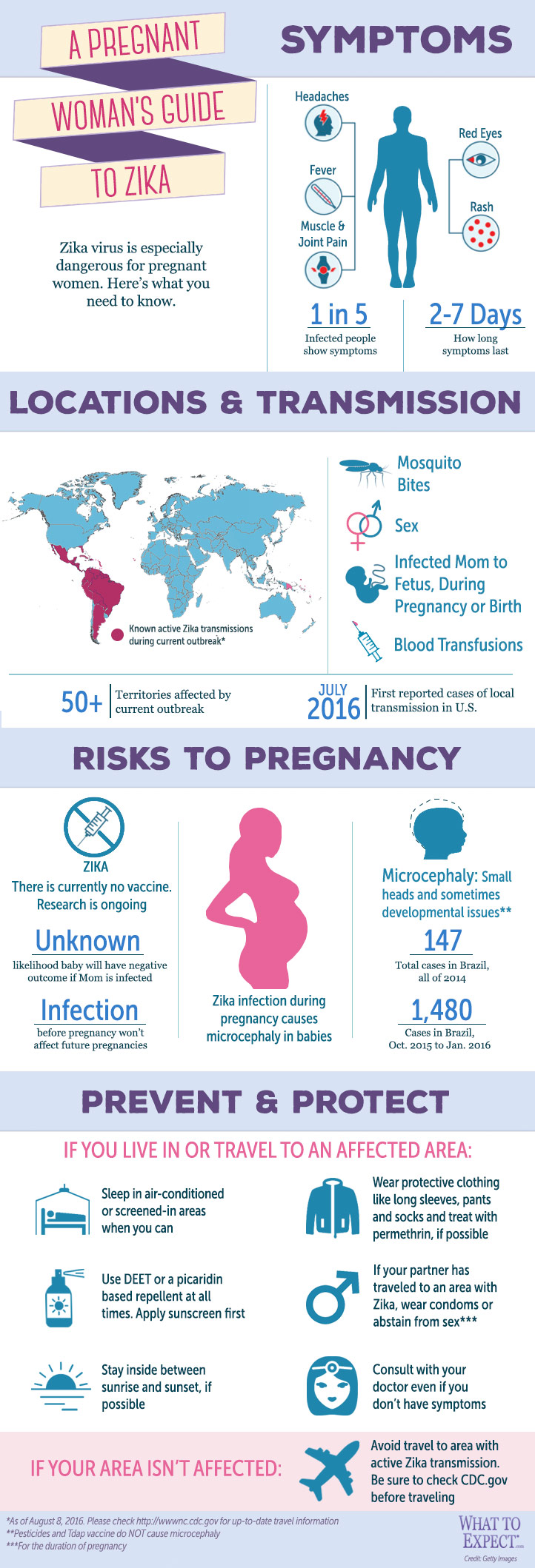The spread of the Zika Virus has added a lot stress to many women’s pregnancies. One way to try and alleviate that worry is by staying as well informed as possible about how to stay Zika-Free. Here, we’re sharing the most up-to-date tips on how to protect yourself and your baby, excerpted from the newly published 5th edition of What to Expect When You’re Expecting.
Mosquitoes Find Pregnant Women Delicious
If mosquitoes seem to love snacking on you more than ever now that you’re pregnant, it’s not just your imagination. Scientists have found that pregnant women attract twice as many mosquitoes as nonpregnant women, possibly because those pesky bugs are fond of carbon dioxide and pregnant women tend to take more frequent breaths, thereby releasing more of this mosquito-friendly gas. Another reason why mosquitoes make a beeline for expectant mothers: They’re heat-seeking, and expectant mothers generally have higher body temperatures, what with all that baby making going on. Most of the time, all this added attention from mosquitoes is merely an itchy nuisance. But when mosquito-borne illnesses are involved, bites can spread disease that might be dangerous to you and your baby (as with the Zika virus; see here). That’s why it’s important to take precautions if you live in or must travel to an area where mosquitoes pose a health risk (including checking with your practitioner—and current travel warnings—before considering a trip to such an area): Stay indoors as much as possible in heavily mosquito-infested areas, use tight-fitting screens on windows to keep mosquitoes out, wear protective clothing sprayed with permethrin (just don’t get any on your skin), and apply insect repellent on exposed skin. Repellents containing DEET or picaridin offer the best defense against mosquitoes. These EPA-registered ingredients are considered both effective and safe during pregnancy. Repellents with purified forms of plants like citronella and cedar can help ward off bugs, but since they’re not as effective as DEET or picaridin, don’t rely on them in high-risk areas.
Always apply repellent after you’ve applied sunscreen, and be prepared to reapply sunscreen more frequently, since DEET decreases SPF. Products that combine repellent and sunscreen aren’t recommended.
Protecting Against Zika Virus
Zika virus is an infection spread by mosquitoes (and in some cases through sex). Though it isn’t normally risky for the general population, usually causing mild symptoms (or sometimes no noticeable symptoms at all), the virus has been linked both to miscarriage and serious birth defects—such as microcephaly (a small head) and brain damage—in babies of moms infected during pregnancy. If you live in or must travel to a region where Zika is prevalent (the CDC recommends that you don’t travel to these areas), protect yourself against mosquito bites (see box). If your partner has traveled to a Zika-affected region, the CDC advises that you abstain from sex or use a condom during sex for the rest of your pregnancy. If you do become infected with the Zika virus during pregnancy (or if you think you might have been infected with it), you’ll get a blood test and ultrasound and your pregnancy will be monitored more closely.
For the latest information, visit cdc.gov/zika, or visit What to Expect‘s Guide to the Zika Virus and Pregnancy here.






No Comments